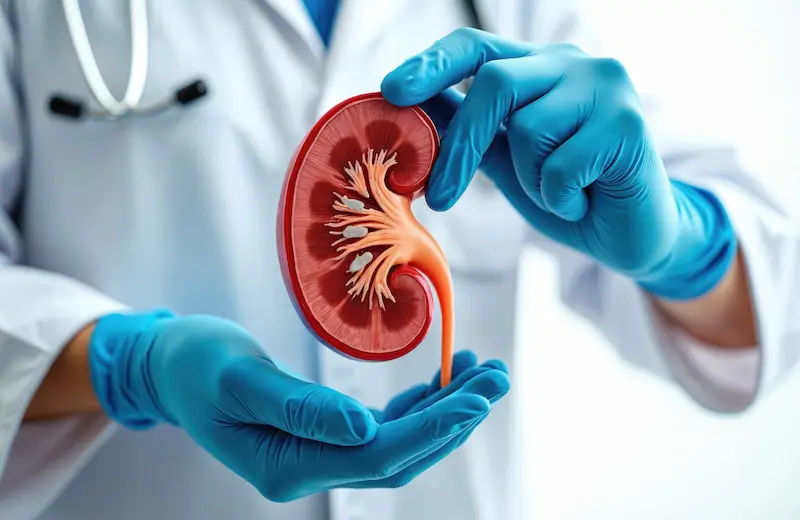Meningioma Treatment Options Overview
Explore treatment options for meningioma, including surgery, radiation therapy, and observation strategies. Learn how treatment choices vary based on tumor size, location, and symptoms.

Written by Dr. M L Ezhilarasan
Reviewed by Dr. D Bhanu Prakash MBBS, AFIH, Advanced certificate in critical care medicine, Fellowship in critical care medicine
Last updated on 13th Jan, 2026

If you or a loved one has been diagnosed with a meningioma, you may have questions about what it is, how it affects your health, and what treatment options are available. This guide is designed to provide clear, compassionate information to help you understand your condition and make informed decisions about your care.
What Is a Meningioma?
A meningioma is a type of brain tumor that develops in the meninges, the protective membranes covering the brain and spinal cord. Most meningiomas are non-cancerous (benign) and grow slowly. However, some can be atypical (grade II) or malignant (grade III), requiring more aggressive treatment.
Common Symptoms of Meningioma
Symptoms depend on the tumor’s size and location but may include:
Headaches (often worse in the morning)
Seizures
Blurred vision or double vision
Weakness in arms or legs
Memory or concentration problems
Personality changes
If you experience any of these symptoms, consult a doctor for further evaluation.
Consult top Neurologist
How Is Meningioma Diagnosed?
Doctors use several tests to diagnose meningioma:
MRI (Magnetic Resonance Imaging) – Provides detailed images of the brain.
CT Scan (Computed Tomography) – Helps detect bone changes caused by the tumor.
Biopsy (if needed) – A small tissue sample is taken to confirm the diagnosis.
If you need to schedule a diagnostic test, you can book an MRI or CT scan through Apollo 24|7 for a quick and hassle-free experience.
Treatment Options for Meningioma
The best treatment depends on factors like tumor size, location, and whether it’s causing symptoms. Here are the main options:
1. Observation (Watchful Waiting)
If the tumor is small and not causing symptoms, doctors may recommend regular monitoring with MRI scans.
No immediate treatment is needed unless the tumor grows or symptoms worsen.
2. Surgery (Resection)
Surgery is the most common treatment for symptomatic or growing meningiomas.
The goal is to remove as much of the tumor as possible without damaging healthy brain tissue.
Recovery time varies; some patients may need rehabilitation therapy.
3. Radiation Therapy
Used if the tumor cannot be fully removed with surgery or if it returns after surgery.
Types of radiation therapy:
Stereotactic Radiosurgery (SRS) – Precise, high-dose radiation (e.g., Gamma Knife or CyberKnife).
Fractionated Radiation Therapy – Lower doses given over several sessions.
4. Medications (Rarely Used)
Most meningiomas do not respond well to chemotherapy, but some medications may help control symptoms.
Hormone therapy (for certain types) is being researched.
Lifestyle and Supportive Care Tips
While treatment is essential, lifestyle adjustments can help improve overall well-being:
1. Healthy Diet
Eat a balanced diet rich in fruits, vegetables, whole grains, and lean proteins.
Stay hydrated to support brain function.
2. Regular Exercise (As Tolerated)
Gentle activities like walking or yoga can help maintain strength and reduce stress.
3. Stress Management
Meditation, deep breathing, and counseling can help cope with anxiety related to the diagnosis.
4. Follow-Up Care
Regular MRI scans are crucial to monitor tumor growth.
Keep all medical appointments and report any new symptoms to your doctor.
When to Seek Immediate Medical Help
Contact your doctor immediately if you experience:
Sudden, severe headaches
New seizures
Sudden vision changes
Difficulty speaking or walking
If you have concerns or need expert advice, consider booking a consultation with a neurologist or neurosurgeon through Apollo 24|7 for personalized care.
Conclusion
A meningioma diagnosis can be overwhelming, but most cases are treatable with the right approach. Whether through observation, surgery, or radiation, modern medicine offers effective ways to manage this condition.
Consult top Neurologist
Consult top Neurologist

Dr. Ganeshgouda Majigoudra
Neurologist
10 Years • MBBS, MD ( GENERAL MEDICINE) DM (NEUROLOGY)
Bengaluru
Apollo Clinic, JP nagar, Bengaluru

Dr Rajashekar Mummadi
Neurologist
3 Years • MBBS, DNB General Medicine, DRNB Neurology
Hyderabad
Dr Ram's Neuro Clinic, Hyderabad

Dr. E Prabhakar Sastry
General Physician/ Internal Medicine Specialist
40 Years • MD(Internal Medicine)
Manikonda Jagir
Apollo Clinic, Manikonda, Manikonda Jagir
(150+ Patients)

Dr S Selvin
Neurologist
10 Years • MBBS, MD, DM (Neurology), FINR fellowhsip in Interventional Neuro Radiology
Chennai
Apollo Speciality Hospitals Vanagaram, Chennai

Dr. Meena Gupta
Neurologist
49 Years • MBBS, MD (Paediatrics), DM (Neurology)
Gurugram
APOLLO SUGAR CLINICS GURUGRAM, Gurugram




